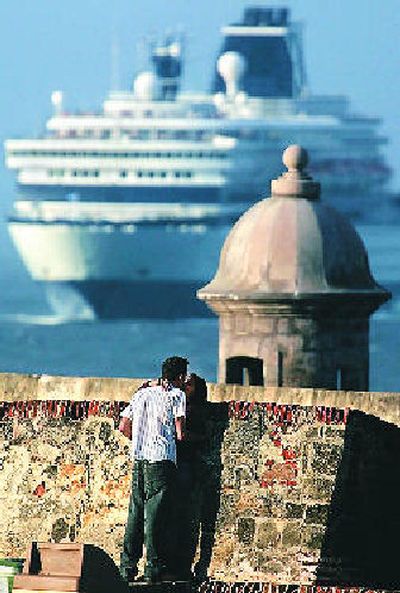Passport regulations scare off tourists

SAN JUAN, Puerto Rico – Bride-to-be Megan Ziemba was weighing two Caribbean destinations for her winter wedding when the U.S. government stepped in and tipped the balance.
Ziemba, a New Yorker, chose a colonial mansion in Puerto Rico, where her 100 guests won’t have to worry about a new passport requirement that has given the U.S. territory an edge in the crowded Caribbean tourism market.
American air travelers, who long have been able to visit most islands, plus Mexico and Canada, with only a driver’s license, now have to show a passport upon their return to the states – posing a problem for the more than 70 percent of U.S. citizens who don’t have one, and posing a threat to tourism-dependent nations.
As a result, Puerto Rico and the neighboring U.S. Virgin Islands expect a windfall from impulse vacationers and wedding planners like Ziemba.
“We have a lot of family coming down and I know they don’t have passports,” the 27-year-old financial auditor said.
Puerto Rico is aggressively branding itself as a no-passport destination with a $36 million advertising campaign on the U.S. mainland. The U.S. Virgin Islands has labeled itself “America’s Caribbean.”
The pitch has aggravated rivalries in the region’s $23 billion tourism industry. The U.S.-administered islands, which joined a regional campaign to delay the measure, now face accusations of betrayal from sister islands.
“The technical term is breaking ranks,” said Basil Smith, director of Jamaica’s tourism board. “I do recognize their tremendous competitive advantage, and frankly I wish Jamaica had such a competitive advantage.”
While the new rules require a passport for foreign air travel, Americans don’t need one for sea or land travel – at least not until 2008, when another round of regulations is expected to take effect.
That’s good news for Americans who prefer cruises and those within driving distance of Canada or Mexico, but it’s galling to island governments.
Tourism officials say the staggered implementation gives the cruise industry a competitive advantage. Cruise ship passengers, who typically stay in port for only a few hours, also spend much less than overnight visitors.
Analysts say Puerto Rico will likely experience a jump in bookings, at least initially, with losses expected elsewhere. A 2005 study commissioned by the Caribbean Hotel Association found the measure jeopardized as much as $2.6 billion in tourism revenue and 188,000 jobs in the region.
Ziemba, who was tempted by a mountainside resort in St. Lucia before choosing the cobblestone streets of Old San Juan for her wedding, said the wide availability of direct flights boosted Puerto Rico’s appeal. Many of her guests have arranged to spend a week and take in the island’s old Spanish forts, palm-lined beaches and jungle rain forests.
“We both wanted something unique and different, and Puerto Rico seemed to make sense for everyone,” she said.
Hoteliers and tourism boosters in the U.S. territories say they need to advertise heavily to make sure people know their special status.
“We’re making sure people know that even though we’re in the Caribbean, you don’t need a passport,” said Nelly Cruz, a spokeswoman for the Puerto Rico Tourism Company.
Americans account for more than half the tourists in the region overall, including 87 percent in the Bahamas and 73 percent in Jamaica – destinations expected to experience the most severe effects of the new passport rule.
With first-time applicants typically waiting six weeks for a passport, the islands say their greatest loss will be last-minute getaways. For budget travelers, cost could also be a factor – passports cost $97, or $82 for children.
Hotels and tour operators have responded with incentives such as a free day-trip at The Arawak Beach Inn in Anguilla or discounts and a free massage and cocktail at the Ladera Resort in St. Lucia.
At Club Peace & Plenty, a resort on the Bahamian island of Exuma that has already had cancellations from Americans who learned about the rule too late, a family can be reimbursed for the cost of obtaining up to four new passports.
“Some of our guests have been coming for over 30 or 40 years, and they’re very used to being able to come and go with just a driver’s license,” said Barry Benjamin, the hotel’s vice president for sales. “I really don’t want to see them inconvenienced at all.”
In Mexico, Marriott resorts have offered $100 traveler’s checks for first-time passport users.
Since the Department of Homeland Security announced the new rules in 2005, Caribbean governments have pleaded for equal footing with the cruise industry, some invoking their support for U.S. anti-drug operations.
At commuter terminals in New York, Washington and Boston, Jamaica’s tourist board has set up information booths where potential visitors can collect passport applications while sipping free cups of the island’s famous Blue Mountain coffee.
Still, tour operators, airlines and others expect plenty of people will be surprised by the measure. Caribbean tourism officials hope any damage isn’t long-lasting.
In Ziemba’s case, St. Lucia won’t entirely lose out: She and her husband – who, unlike some of their relatives, do have passports – are leaving from San Juan on a honeymoon cruise that will stop in five islands, including the St. Lucian capital of Castries.